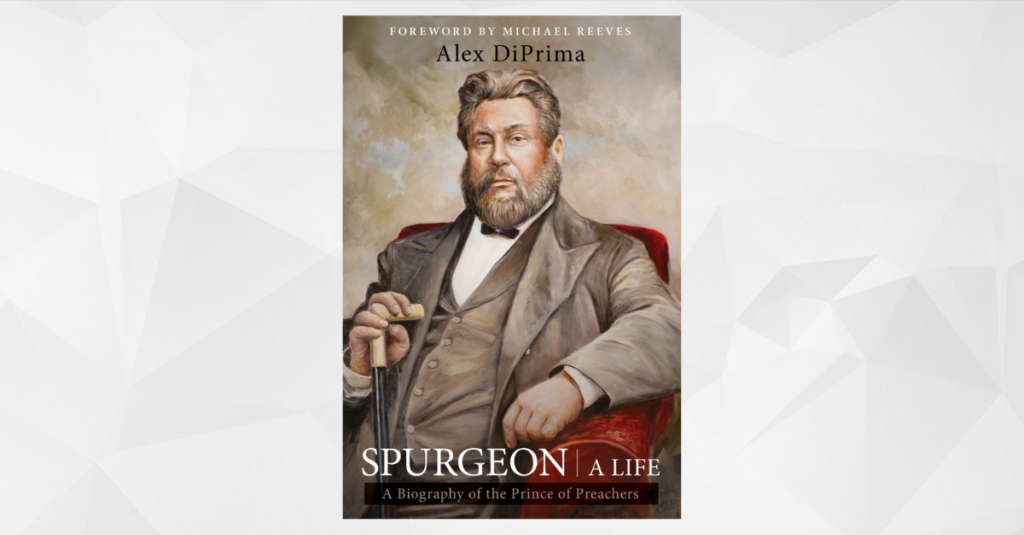Five Strengths of a New Biography on Charles Spurgeon
June 23, 2025

June 23, 2025
Alex DiPrima, Spurgeon: A Life. Reformation Heritage Books, 2024. 312 pages.
One great joy in the Christian life is biographies that stir up a deep yearning to devote soul, mind, and body wholeheartedly to Christ. Spurgeon: A Life is such a biography.
Alex DiPrima has done something remarkable. He has written a crisp, compelling one-volume biography of one of the most illustrious pastors of the last two centuries.
Growing up with a Lutheran father who loved Spurgeon the Baptist, I was always intrigued. Why Spurgeon? Recently, a pastor friend, when I mentioned this book, replied, “I stay away from Spurgeon. He’s everywhere. People are quoting and referencing him. It’s too much.”
Why, a century and a half later, is Spurgeon everywhere? DiPrima does an excellent job of making it obvious—Spurgeon’s life and ministry were remarkable. As you spend time with him, you spend time with one who has spent time with Jesus, so your gaze moves from Spurgeon to Spurgeon’s God.
Any quibbles I have with the book are not worth mentioning; instead, consider five strengths that will profit readers.
DiPrima very ably told Spurgeon’s story without getting bogged down with too many details. This is especially well received by readers given that the breadth of Spurgeon’s ministry was second to none.
DiPrima begins with Spurgeon’s rise. He was converted at fifteen and began preaching at sixteen. He became a pastor at seventeen and was called to pastor the most prominent church in London at nineteen. DiPrima’s telling of Spurgeon’s call to London was bracing; a boy from the rural village of Essex relocates to the world’s largest city, filled with all measures of filth and vice.
Yet young Spurgeon persevered, and by age twenty, he had preached six hundred sermons. Amazingly, the first biography of Spurgeon was written when he was 21. By his mid-twenties, he was pastoring the largest church in the Protestant world.
Spurgeon’s productivity was phenomenal. He preached 10 times a week often, he published a sermon a week for 35 years, he wrote 150 books, he founded and oversaw 66 institutions (like the orphanage and the Pastor’s College), and he pastored a church of over 5,000 people. All this while suffering from gout, depression, and the weight of slander. How did he do it? He worked 18 hours a day for the cause of Christ and counted it all joy.
Coming through on every page is Spurgeon’s devotion. As our age drowns in stories of wayward pastors, Spurgeon stands exemplary. He is worthy of emulation not so much in his productivity—which few (if any) can match—but in his wholehearted devotion to Christ and his kingdom. As he once concluded a letter, “One thing is due to every minister, and I pray you to remind the church of it, namely that in private as well as in public, they must all earnestly wrestle in prayer to the God of our Lord Jesus Christ, that I may be sustained in the great work” (82).
Spurgeon was sustained, indeed, even as great work held hands with great suffering. Here, we see a third aspect of his life that DiPrima highlights so effectively.
To understand Spurgeon is to come to grips with his immense physical pain and the unrelenting criticism aimed at him by others. From this deep well of suffering flowed the Christ-like compassion that marked his preaching and writing. His consistent appeal to beleaguered believers’ fainting hearts is marked with tenderness.
Suffering doesn’t produce tenderness on its own, but suffering with God does. Spurgeon had cast himself upon the Lord, entrusting himself to his faithful Creator amidst wind and wave, dart and thorn. DiPrima writes, “One of the reasons for Spurgeon’s ongoing relevance nearly a century and a half after his death surely has to do with his immense suffering and his extraordinary ability to apply comfort and consolation to those who experience similar affliction” (318).
A fourth aspect of Spurgeon’s life and ministry that jumps off the page is how relentlessly Christ-centered he was. From mercy ministries to public worship, all pulsated with the same heartbeat.
[Spurgeon] wanted people to walk away with the highest possible thoughts of the love of God in Christ and a sense of having experienced God’s presence among them in worship. To see Christ clearly and to treasure him as Lord and Savior was the grand object of the Tabernacle’s worship services.
Spurgeon ministered from the fear of God, allowing him to speak against the widely accepted compromises of his day. DiPrima succinctly tells the story of his courageous stands and the requisite tolls they exacted, including the Downgrade Controversy, when Spurgeon confronted rising theological liberalism in Great Britain. Spurgeon declared two years into the controversy, “I am quite willing to be eaten of dogs for the next fifty years, but the more distant future shall vindicate me” (251). As one reads of the God-given courage and clarity of Spurgeon’s ministry, one can’t help but pray for the same spirit.
DiPrima’s biography will help a new generation know more of Spurgeon and Spurgeon’s God.